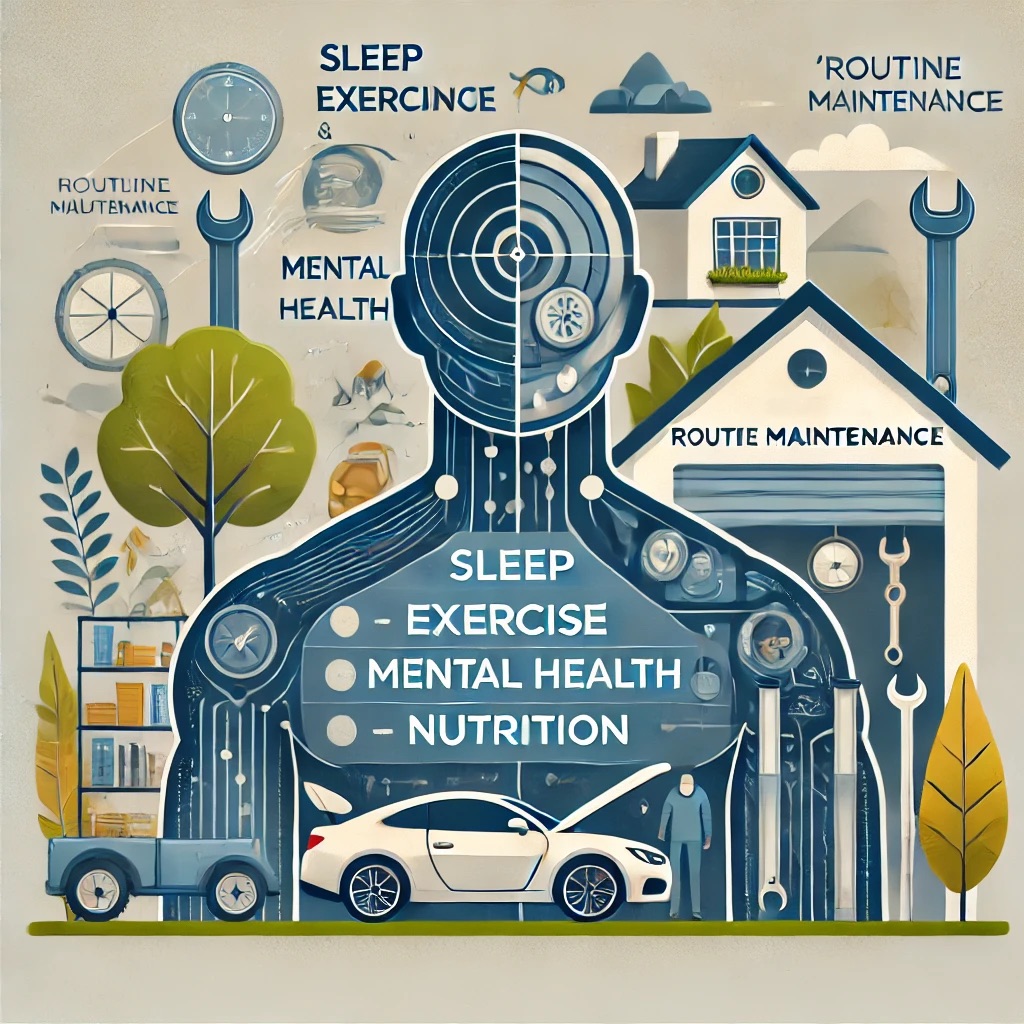Owning anything with pride—whether a vehicle, a home, a business, or even your own body—requires a commitment to ongoing maintenance. It’s a truth we all know, yet often ignore. A car needs oil changes, new tires, and routine check-ups to keep running smoothly. A house needs cleaning, repairs, and upgrades to remain livable. A business needs constant oversight, planning, and reinvestment to thrive. Yet somehow, when it comes to the most important “possession” we have—our bodies and minds—we forget the basic principle: neglect leads to decline.
The Illusion of Replacement
When maintenance feels overwhelming or inconvenient, the temptation to start fresh can be strong. Some people might even suggest that instead of dealing with regular vehicle repairs, it’s better to just buy a new car. But this illusion of replacement ignores a fundamental reality: everything requires care. New cars still need maintenance. New homes still need upkeep. And a new job, relationship, or phase of life won’t solve the deeper issues that come from within us.
The same logic applies to our bodies and minds. There’s no “new model” for us to trade in. We get one body, one mind, and one lifetime. What happens if we fail to maintain them? The cracks begin to show—physically, emotionally, and mentally.
The Cost of Neglect
Routine maintenance might feel tedious, but the cost of neglect is far greater. When you skip regular check-ups or ignore warning signs, small issues can snowball into major crises. Physical exhaustion turns into chronic illness. Emotional stress evolves into burnout. Minor discomforts in relationships or work morph into irreparable breakdowns. Just like a neglected car that suddenly won’t start, our systems eventually demand attention—often at the worst possible moment.
Maintenance as a Form of Ownership
Maintaining what you own isn’t just about keeping it functional; it’s about honoring your investment. When you own a car, pride in ownership means taking care of it. When you own a home, you paint, repair, and renovate not just because you have to, but because you want it to reflect the care you put into it. The same is true of yourself.
Sleep, exercise, proper nutrition, mental health care—these aren’t luxuries. They’re basic acts of respect for the body and mind that carry us through life. Neglecting these needs isn’t just self-destructive; it undermines our ability to serve others, pursue our goals, and experience joy.
Why Do We Forget?
So why do we forget to maintain ourselves?
1. The Culture of Busyness
We live in a society that glorifies hustle and productivity. Taking time to rest or prioritize self-care is often seen as laziness or weakness. We push through exhaustion, ignoring the warning lights on our dashboard, until we crash.
2. The Quick-Fix Mentality
We’re conditioned to seek instant gratification and quick solutions. Why take the time to address underlying issues when we can slap on a temporary fix? This mindset keeps us from investing in the slow, consistent work of real maintenance.
3. A Lack of Awareness
Sometimes we don’t even realize we’re neglecting ourselves. Stress becomes our baseline. Fatigue feels normal. By the time we notice the problem, it’s already a crisis.
Building a Maintenance Mindset
If we’re going to thrive—not just survive—we need to rethink how we approach self-care.
• Schedule Regular Check-Ups
Just like a car needs routine inspections, our bodies and minds benefit from regular attention. This includes annual physicals, mental health check-ins, and time set aside to reflect on your emotional state.
• Prioritize the Basics
Sleep, exercise, and nutrition are the foundation of self-maintenance. These aren’t negotiable luxuries; they’re essential.
• Listen to the Warning Signs
Don’t ignore the small indicators that something’s off. Fatigue, irritability, or physical pain are your body’s way of asking for maintenance.
• Invest in Preventative Care
It’s easier to keep something running than to fix it after it breaks. Therapy, mindfulness, hobbies, and rest are all forms of preventative care that pay dividends over time.
• Let Go of Perfectionism
Maintenance doesn’t mean you’ll always function perfectly. It means you’re committed to showing up for yourself, even when things aren’t ideal.
The Ultimate Ownership
The most profound ownership we have is of ourselves—our bodies, our minds, our lives. Taking pride in that ownership means committing to the constant, often unglamorous work of maintenance. You wouldn’t drive your car until the wheels fall off and expect it to keep going. So why would you treat yourself that way?
The truth is, you can’t always sell. You can’t replace yourself. You’re in it for the long haul. And the effort you put into maintaining what you own—especially yourself—determines the quality of the journey ahead. See you out there.
Discover more from Inside the mind of Wade
Subscribe to get the latest posts sent to your email.


